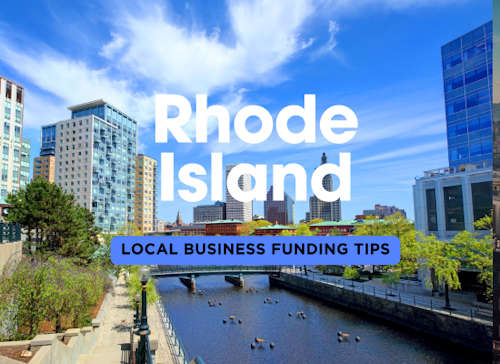Navigating the world of business financing can feel overwhelming, especially if you’re a small business owner in Rhode Island. Fortunately, there are plenty of options tailored to meet your needs, whether you’re just starting out or looking to expand your existing business. This guide will walk you through various loan options available in the Ocean State, giving you the scoop on loan types, rates, amounts, and what to watch out for. So grab a coffee, kick back, and let’s dive into the financing landscape of Rhode Island!
| Loan Type | Interest Rates | Loan Amounts | Pros | Cons |
|---|---|---|---|---|
| Small Business Administration (SBA) Loans | 6% – 10% | $5,000 – $5 million | – Low interest rates – Long repayment terms – Flexible use of funds |
– Lengthy application process – Strict eligibility requirements |
| Traditional Bank Loans | 4% – 12% | $10,000 – $500,000 | – Established reputation – Potential for lower rates |
– Rigid application process – Requires solid credit history |
| Online Business Loans | 7% – 25% | $5,000 – $500,000 | – Fast approval times – Less paperwork |
– Higher interest rates – Shorter repayment terms |
| Credit Union Loans | 5% – 15% | $1,000 – $250,000 | – Member-focused service – Competitive rates |
– Limited availability – Membership requirements |
| Business Lines of Credit | 8% – 24% | $10,000 – $500,000 | – Flexibility to borrow as needed – Only pay interest on drawn amounts |
– Variable interest rates – May have annual fees |
| Merchant Cash Advances | 20% – 40% | $5,000 – $250,000 | – Quick access to cash – No collateral required |
– High costs – Daily repayments can strain cash flow |
| Equipment Financing | 6% – 12% | $5,000 – $1 million | – Secured by the equipment itself – Can improve cash flow |
– Equipment must be essential – Limited to equipment purchase |
| Invoice Financing | 1% – 5% per month | $1,000 – $500,000 | – Quick access to funds based on invoices – Improves cash flow |
– Fees can add up – Depends on customer payment reliability |
| Personal Loans for Business | 5% – 36% | $1,000 – $50,000 | – Easier qualification – Quick access to funds |
– Personal liability – May affect personal credit score |
| Microloans | 8% – 18% | $500 – $50,000 | – Great for startups – Often more flexible terms |
– Smaller amounts available – Higher interest rates compared to banks |
Expert Tips
- Utilize Local Resources 🗺️
Take advantage of Rhode Island’s small business resources, such as the Rhode Island Small Business Development Center (RISBDC) and local chambers of commerce. They offer free consultations and can help you identify the best financing options tailored to your business needs. - Connect with Local Banks and Credit Unions 🏦
Rhode Island has several community banks and credit unions that are more likely to work with small businesses compared to larger banks. Building a relationship with these institutions can lead to better loan terms and personalized service. - Explore State-Specific Grants 🎉
Keep an eye out for state-funded grants designed to support small businesses in Rhode Island. Programs like the Rhode Island Commerce Corporation often have initiatives to help businesses expand and create jobs, providing valuable non-repayable funds. - Leverage Networking Events 🤝
Attend local networking events and business expos in Rhode Island to meet potential investors, partners, and mentors. Engaging with the community can lead to financing opportunities and collaborations that you might not find elsewhere. - Stay Updated on Local Economic Trends 📊
Understanding Rhode Island’s economic landscape can give you a competitive edge. Stay informed about local industries that are thriving, as this knowledge can help you position your business strategically and attract the right financing sources. - Consider Regional Development Programs 🌆
Look into regional development programs that focus on specific sectors, such as marine trades or tourism. These programs often offer unique financing options, mentorship, and resources designed to stimulate growth in targeted industries. - Highlight Your Community Impact ❤️
When applying for loans or grants, emphasize how your business positively impacts the Rhode Island community. Lenders and grant providers are often more inclined to support businesses that contribute to local economic development and job creation. - Tap into Alumni Networks 🎓
If you’re an alumnus of a Rhode Island college or university, leverage those alumni networks for potential funding opportunities. Many institutions have resources and programs to support graduates starting their own businesses. - Consider Seasonal Trends 🌞
Be mindful of Rhode Island’s seasonal economy, especially if you’re in the tourism or hospitality sector. Plan your financing needs accordingly to ensure you have the necessary capital during peak seasons while managing slower periods effectively. - Don’t Forget About Tax Incentives 💵
Research local tax incentives available for businesses in Rhode Island. Programs like the Rhode Island Economic Development Corporation’s incentives can provide significant financial benefits that may complement your financing options.
References
Rhode Island Secretary of State – Business Services
https://www.sos.ri.gov/business
This site provides essential resources for starting and managing a business in Rhode Island, including business registration, annual reports, and compliance information.
Rhode Island Commerce Corporation
https://commerceri.com/
The Rhode Island Commerce Corporation is the state’s primary economic development agency. This site offers information on grants, financing options, and resources to help businesses grow in Rhode Island.
Rhode Island Small Business Development Center (RISBDC)
https://www.risbdc.org/
The RISBDC provides free, one-on-one business advising, training programs, and resources for small business owners in Rhode Island, helping them navigate financing and operational challenges.
Rhode Island Department of Labor and Training
http://www.dlt.state.ri.us/
This site offers information on workforce development, unemployment insurance, and labor market data, which are valuable resources for businesses looking to hire and train employees in Rhode Island.
Rhode Island Economic Development Corporation (RIEDC)
https://www.ri.gov/riedevelopment/
The RIEDC focuses on economic growth in Rhode Island, providing resources and incentives for businesses to invest and create jobs in the state. The site includes information on tax incentives, grants, and development projects.



